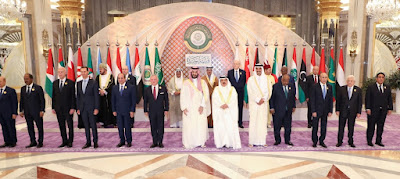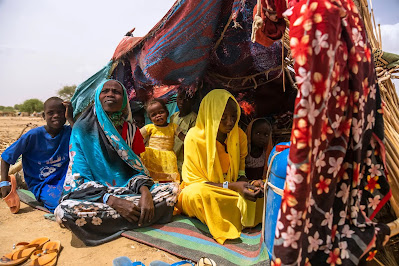NOTE from Sudan Watch Ed: Beige highlight is mine for future reference and to show: a woman with 5 children fled from Sudan to Chad in March; a Chadian official allegedly said Darfur war is just starting; ninety percent of the displaced seem to be children and women; they use westerners' lingo.
At height of Darfur war, usually before rainy season when rebels regrouped and splintered (I stopped counting after 40 groups, identifying them was like trying to nail mercury to a wall) women and children fled to be cared for by humanitarian aid. Rebels looted aid trucks to get the supplies they needed.
Going by what I can gather, people from all walks of life knew weeks before April 15 that fighting would start that week. What were the diplomats and politicians in Sudan doing? It's hard to believe there were no intelligence warnings. The fight for Khartoum was lightning fast and well orchestrated.
The US embassy in Khartoum alone has 70 staff. People acted surprised. It seems what we're being told doesn't add up. I saw a report about Egyptian soldiers on exercises in Sudan being caught April 13 and Burhan and Hemeti falling out over it. I saw it on video which is why I don't have report to hand.
Also during the fast-moving news at that time I glimpsed news of possible war between Sudan and Ethiopia. I've not had time to reprint those reports here for posterity nor much about Bashir & Co being sprung from prison.
The well-planned fight for Khartoum that erupted April 15 seemed different to previous chaotic coups and rebellions. If, as is reported, Sudan has no functioning government why hasn't a state of emergency been declared?
It's easy to remember how much Russia needs and appreciates Sudan's gold in order to keep up its war on Ukraine. And that Hemeti agreed to Russia leasing a port in Port Sudan where China has a port too.
What's China's stance, I wonder. A report HERE recently suggests it's standing back. Next post: Xi sends congratulations to Arab League meeting.
___________________________
Report from The New York Times
By Elian Peltier - Photographs by Yagazie Emezi
Elian Peltier and Yagazie Emezi visited refugee sites on Chad’s Sudan border, where tens of thousands of people have found refuge since a war started in Sudan last month.
Dated Tuesday 16 May 2023, 3:29 p.m. ET - full copy:
Fleeing Generals at War and Violent Militias, Many Say 'We're Not Coming Back'
The war in Sudan has unleashed a new wave of violence in the western region of Darfur, sending tens of thousands into neighbouring Chad, where a new humanitarian crisis is looming.
An estimated 60,000 Sudanese refugees have crossed into neighbouring Chad since the beginning of the war in Sudan in April. More than 90 percent of them are children and women.
Thousands of Sudanese refugees watched as the first emergency aid workers reached a village in Chad, days after escaping from their embattled country. Mothers tended to toddlers, while men listed their most urgent needs — water, vaccines, tarps for the looming rainy season.
The fighting that erupted in Sudan’s capital last month has ricocheted far beyond the city’s borders, worsening instability in the restive western region of Darfur and sending tens of thousands of people fleeing to neighboring countries, including Chad in Central Africa.
As villages in western Sudan empty, villages in eastern Chad are filling up: Camps have sprouted up, sometimes in days, with thousands of tents made of colourful sheets mounted on branches, forming a fragile patchwork of uncertainty.
IMAGE by The New York Times, map of Darfur Region, Sudan
The surging conflict in Darfur is the latest ordeal for a region that has been traumatized by two decades of [SW Ed: alleged] genocidal violence. It has also deepened a humanitarian crisis in Chad, where hundreds of thousands of people displaced from Darfur had already taken refuge.
The United Nations’ Refugee Agency said last week that 60,000 Sudanese had crossed into Chad since the start of the conflict — doubling an earlier assessment, with 25,000 refugees recently registered in the Chadian village of Borota alone. Most had fled Kango Haraza, a village on the other side of the border, in Darfur.
Aid workers from the United Nations’ Refugee Agency registering families in the Chadian village of Borota, a few miles from the Sudanese border.
Two New York Times journalists accompanied the U.N. agency last week into Borota, where tens of thousands of refugees have been without food, water and other essential items.
With Sudan’s most powerful groups, the army and the R.S.F., fighting for control in the capital, Khartoum, the unstable situation in Darfur has spiralled into further violence.
Militias, made up mostly of Arab fighters, have exploited the power vacuum to rampage through cities, loot households and kill an unknown number of civilians, according to aid workers, doctors and local activists. In response, some civilians have begun arming themselves, and non-Arab groups have also retaliated against militias at a small scale.
Along with Khartoum and the two adjoining cities across the Nile, cities in Darfur have been the most affected by the fighting between the Sudanese Army and a paramilitary group known as the Rapid Support Forces. Hospitals have been looted and markets burned.
But while Khartoum had been a peaceful city before April, Darfur has been torn by decades of violence.
More than 300,000 people were killed in Darfur in the 2000s when Sudan’s former dictator, Omar Hassan al-Bashir, ordered militias, widely known as the Janjaweed, to crush a rebellion among non-Arab groups. A popular uprising in 2019 led to Mr. al-Bashir’s ouster, but in Darfur the situation has continued to deteriorate, including with ethnically motivated attacks in recent years.
The latest influx of refugees is also increasing pressure on Chad, a landlocked, vast Central African country that shares 870 miles of border with Sudan and is the among the world’s poorest nations. Its eastern region, semiarid and isolated, already has more than 400,000 refugees from Darfur living in 13 camps, which are now filling with new arrivals helped by the U.N. refugee agency.
In Borota, thousands Sudanese refugees have joined people who had been displaced by earlier conflicts in Darfur.
About 90 percent of the refugees from Darfur recently registered by the United Nations in Chad are women and children. For most families, returning to Sudan is out of the question.
“Move back to what, and where?” said Khadija Abubakar, a mother of five young children who said she fled from Kango Haraza with her husband this month. “As long as there’s no security, we’re staying.”
The violence in Darfur shows no sign of abating. In El Geneina, the capital of West Darfur and 15 miles from Chad, armed groups have looted health care facilities and burned refugee camps. Hospitals are out of service, and humanitarian workers have fled the city for Chad, leaving thousands of people in need and trapped amid the fighting.
Over the past few days, at least 280 people were killed in El Geneina alone, according to the Sudanese Doctors’ Trade Union. Aid workers and Chadian officials now expect that a pause in the fighting there could push tens of thousands to flee to Chad.
In Borota, which is four miles from the Sudanese border, many refugees had fled earlier eruptions of violence in Darfur, according to Jean-Paul Habamungu, the coordinator of the U.N. agency’s operations in Eastern Chad.
He was one of the first humanitarian workers to reach Borota, arriving on May 11. What he saw stunned him: hundreds of children, most of whom had arrived in the previous days, lining up in front of him, so many people that it caught the local authorities and aid agencies by surprise.
Awa Ibrahim Abakar, 35, a refugee from Darfur now staying in Chad, said gunmen killed her husband and wounded one of her four children.
The refugee encampment is at least four hours away from the closest aid outpost in the region, and some parts of the sandy and bumpy tracks used to traverse the area will soon be submerged in the rainy season. As we crossed a few dried-out wadis, or rivers, on our way to Borota, raindrops appeared and puddles began to form.
Ms. Abubakar, the mother of five, has spent her days waiting for her husband to find food in a nearby village. As she tried to keep two toddlers playing in the dust nearby, she said that she also needed water and soap.
Other Sudanese repeated similar pleas. “We need vaccination for the children, we need tarp for when the rain comes,” said Adoum Ahmad Issa, a 43-year-old father of four who said he had arrived in Chad in early May.
In nearby tents, children in rags dozed on their mother’s laps, while other parents prepared madeeda hilba, a thick porridge, and grilled small grasshoppers in the 100-degree heat. Most appeared to have fled with little more than a few cooking supplies, sheets and mats and, in some cases, a donkey.
Mr. Issa and nearly two dozens other refugees interviewed this month said the violence in Darfur had preceded the fighting in Khartoum. But many said the new conflict had only made things worse.
It is unclear how many people have died in Darfur, but they are estimated to be in the hundreds. At least 822 civilians have been killed and more than 3,200 injured in the month long conflict, according to the doctors union.
At the border between Koufroune in Chad, and the Sudanese village of Tendelti, people journey back and forth to gather personal belongings.
Aid agencies have rushed to try to help refugees who have gathered in Chad, often in sites miles apart. In some areas, like in the Chadian border village of Koufroune, refugees have managed to bring furniture, mattresses and bed frames.
On a recent morning, some men and teenagers on horse-drawn carts crossed a dried riverbed — the border between the two countries — journeying back and forth between Koufroune and the Sudanese village of Tendelti, just on the other side. Some villagers said they fled under gunfire in the early days of the conflict. Tendelti now stands emptied of most residents.
A few Chadian soldiers stood guard by the riverbed, under the shade of mango trees bending under the weight of ripe fruit.
“Tendelti is now here, in Chad,” said Fatima Douldoum, a 50-year-old mother of five who said she fled in late March. Relatives crossed back in April to retrieve their beds.
“Tendelti is now here, in Chad,” Fatima Douldoum, left, a 50-year-old mother of five, said referring to her village in Darfur. She sat with her family under a tent made of scarves and other fabric.
“It is the first time so many people are bringing everything they can,” said Aleksandra Roulet-Cimpric, the country director for the International Rescue Committee, an aid organization providing health services in Koufroune. “It’s also the first time so many of them say ‘We’re not coming back.’”
Kango Haraza, too, is now mostly empty, and in recent days people have reached Borota from other Sudanese communities, said Mr. Habamungu of the U.N. agency.
As he visited the site last week, Mr. Habamungu said a Chadian official told him that the war in Darfur was only starting. “That made me pause and wonder,” Mr. Habamungu said. “How we are going to cope?”
A family from Darfur organized their belongings under a tree in Koufroune, Chad. Aid agencies have struggled to provide aid to the swelling number of Sudanese refugees arriving in Chad.
Violence in Sudan
Fighting between two military factions has thrown Sudan into chaos, with plans for a transition to a civilian-led democracy now in shambles.
Elian Peltier is the West Africa correspondent. He joined The Times in 2017 and was previously based in Paris and London. He now lives in Dakar, Senegal. @ElianPeltier
View original: https://www.nytimes.com/2023/05/16/world/africa/chad-sudan-conflict.html
[Ends]








.jpeg)
.jpeg)
.jpeg)
.jpeg)

.jpeg)